None of this information is particularly new "news" to most people. However, the increase of violence in these uprisings is showing the emotional/psychological state of many in this vast region. Whether or not all generations are in agreement as to what their particular goals might be they still move forward with destabilizing their governments. The sources of strength that these protestors are relying on are in all reality radical formats of the same thing they are overthrowing. Religious movements that are espousing additional platform ideas support them, and they are bent on radical implementation of Moslem laws and possibly a poll tax for any who are not Moslem (and this writer does not doubt other measures, that Jews are already familiar with from history).
The overthrow of many of the old dictatorships in the Middle East, signals the seasons of change in the region. However, as Syria destabilizes (the traditional citadel of Arab nationalism in the region), Arab leaders are inviting protest organizers to join them in the Arab League. This is bold marker for policy makers in the region and signals a recognition of weakness....Namely, they are thinking, "Hey, we don't seem to be winning, we cannot repress these people enough, the international community is crying out against such actions. So, we can't beat them, so let's have them join us." It could be said that this is a very simple assessment of this complex region to be sure, however this is age-old policy "if you can't beat 'em, join em (or in this case include them in your power)'".
What is definitely assured is that as old governments fall and new ones come into place, treaties between Israel and some neighbors will need to be re-evaluated and addressed once more. The destabilization in Egypt has lead to a rise in the numbers of radical and extreme Islamic fundamentalists in the Sinai region. This is one of the first regions Israel invaded during the Seven Day's War, when they drove all the way to Cairo before the International community's outcry brought about the end of the Israeli counterattack on Egypt. The current and interim leadership of Egypt may remember that war and how costly it was to the nation, on the other hand they may not. It is in wanting to amend history, to "right" the history of their nation, that the greatest danger to Israel from the south arises.
